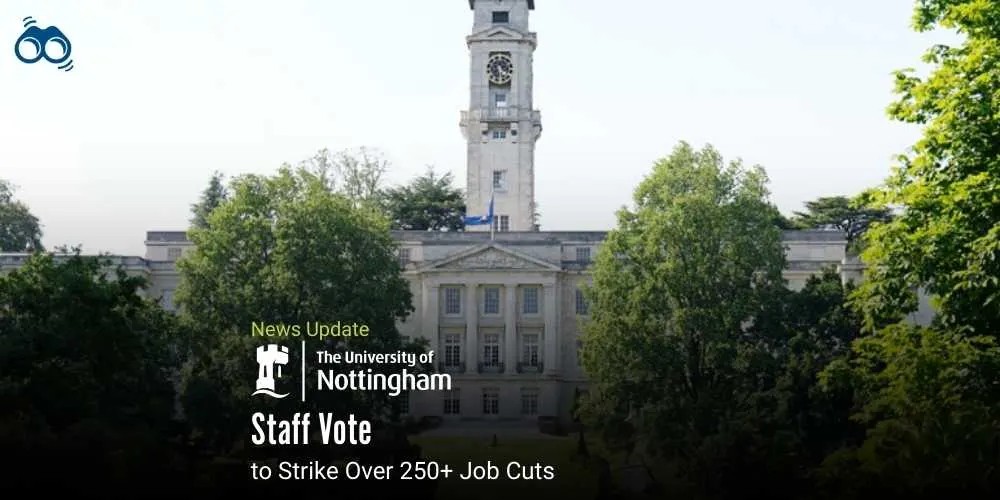Strike Ballot at Nottingham Highlights Tensions in UK Higher Education
Nottingham University Workers Back Strike Amid Restructuring Plans
Amid growing unrest across the UK higher education sector, the University of Nottingham faces mounting pressure as staff vote in favour of industrial action over proposed job cuts. The decision reflects deepening concern about workforce reductions and financial restructuring, raising urgent questions about institutional priorities and the future of academic and professional services.
According to union officials, the university’s cost-saving measures could lead to the loss of over 250 roles, including 98 vacant posts, as part of a wider restructuring plan. Earlier this year, the university launched a consultation outlining proposals to cut a total of 356 positions. Union representatives argued that these higher education job losses unfairly placed the burden of financial recovery on staff, many of whom already face increasing workloads and limited resources. Although the strike has not yet been scheduled, it is expected to involve professional services employees, including library staff, administrators, and security officers, roles that are vital to the daily functioning of the university.
In response, a university spokesperson stated that Nottingham “respected” the right of staff to take action. They explained that the proposals were part of the Future Nottingham programme, which aims to balance long-term institutional ambitions with the serious financial challenges currently facing the UK higher education sector. The university also reaffirmed its commitment to ongoing dialogue with unions to address concerns while safeguarding operational sustainability.
Union officials confirmed that 78% of those voting supported the strike, reflecting widespread frustration among staff. Elliot Dean, Unison East Midlands head of higher education, noted that “no one takes the decision to strike lightly,” but staff felt compelled to act after what they viewed as poor leadership decisions. UNISON had submitted an alternative financial proposal that could have saved the university up to £50 million without compulsory redundancies; however, only five posts were ultimately preserved. Concerns have also been raised about the university’s recent spending decisions, including a £47 million investment in the Castle Meadow Campus and a £37.5 million purchase of the former HMRC site. These figures have prompted criticism from staff and unions, who argue that infrastructure expansion is being prioritised over workforce stability.
The situation at Nottingham reflects a broader trend across the sector. Other Russell Group universities, including Newcastle, Durham, and Sheffield, have faced similar unrest, with staff balloting for strike action in response to job insecurity and budget cuts. Union leaders warn that widespread job reductions risk undermining student services, eroding staff morale, and weakening the UK’s reputation for academic excellence. As the university prepares for further negotiations, the outcome of this dispute may well shape how institutions nationwide navigate the balance between financial resilience and fair employment practices. The future of higher education depends not only on bold plans but on the people who deliver them.
Editor’s Note
The University of Nottingham’s plan to reduce its workforce by more than 350 roles has opened an important debate about the future of higher education in the UK. With staff voting strongly in favour of strike action, the dispute highlights a difficult question: how can universities remain financially sustainable while also protecting the people who make them work? Professional service staff, including library workers, administrators, and security officers, are crucial to university operations yet often unseen. Their strike highlights deep campus-wide frustration over job security and how institutions value employees. Union leaders proposed cost-saving alternatives to protect jobs, yet few were secured, raising questions about leadership's choices and whether staff voices are truly heard. University spending on new facilities, criticised by unions, prioritises infrastructure over staff, undermining morale. This reflects a wider trend in higher education, with universities facing unrest over job insecurity and heavy workloads. Unresolved cuts risk harming student services, staff morale, and the UK's global reputation for academic excellence.
Skoobuzz emphasises that the University of Nottingham must show leadership that balances ambition with fairness. Transparent dialogue with staff and unions, a willingness to consider alternatives, and a recognition of the essential contribution of employees are crucial steps forward.














0 Comments (Please Login To Continue)